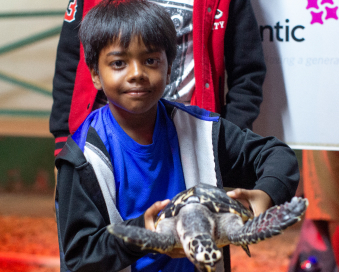Even while implementing measures to help protect its staff and business during the pandemic, LNG production company Atlantic has not lost focus on its commitment to promote biodiversity awareness.
The International Day for Biological Diversity was commemorated by the United Nations on May 22 under the theme ‘Our solutions are in nature’, but due to COVID-19, the UN observance took the form of an online-only campaign.
Atlantic has also planned a virtual approach to its annual promotion of biodiversity awareness. For the remainder of the year, the company will host online awareness lectures by environmental experts, targeting its employees and service providers. Atlantic will also continue its ongoing recycling programme for employees, their families and communities.
The first online environmental lecture was held in April and featured a presentation by Kyle Mitchell, Chairman of Nature Seekers, the Matura-based turtle conservation NGO. Mr. Mitchell discussed the local turtle season and conservation initiatives. A second lecture will be held as part of Atlantic’s observance of World Environment Day (June 5), and will feature Kishan Kumarsingh, Head of the Multilateral Environmental Agreements Unit in the Ministry of Planning. Mr. Kumarsingh will discuss the Paris Agreement and some of the implications for Trinidad and Tobago.
Biodiversity refers to all the variety of life that can be found on Earth (plants, animals, fungi and micro-organisms) as well as to the communities that they form and the habitats in which they live. Biodiversity plays a significant role in terrestrial and aquatic ecosystems (e.g. farms, croplands, aquaculture, nature preserves, forests) and sustains human livelihoods by helping to provide food, health, economic and cultural value and defence again climate change.
Biodiversity loss and ecosystem collapse is one of the top five risks in the World Economic Forum’s (WEF) 2020 Global Risks Report. According to a 2017 study by the Proceedings of the National Academy of Sciences, humans have caused the loss of 83% of all wild animals and half of all plants. The World Wildlife Fund has reported that up to 1 million species of plants and animals are at risk of extinction and 40% of insects are under threat. Human encroachment on plant and animal life is also believed to be a chief contributor to the spread of diseases



